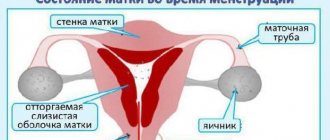Most women experience dizziness before their menstrual cycle. Many of them suffer from the disease during menstruation. The reasons for a specific reaction of the body can be different - from pressure interruptions to the abuse of painkillers. Each body is individual, so the reactions of organisms to the same process may differ.
Physiological reasons
A number of changes occur in a woman’s body every month, which are the cause of ailments. In the second half of the menstrual cycle, the state of hormonal levels changes. The level of estrogen decreases, and the concentration of progesterone begins to rapidly increase, which is the reason for poor health before menstruation. Hormonal imbalance leads to decreased performance, sleep disturbances and sudden mood swings.
After the end of the ovulation period, the body actively prepares for pregnancy. At the same time, it is quite normal for the mammary glands to increase in size and appetite to increase.
If fertilization does not occur, then the reproductive organ is prepared to reject the functional layer of the endometrium, the uterus begins to contract, and women experience pain in the abdomen and sacrum. Such symptoms are often accompanied by weakness and dizziness.
Before the arrival of critical days, a woman’s body may experience a lack of vitamins C and A, as well as microelements such as iron, magnesium, sodium and calcium. For this reason, general malaise, low blood pressure and pale skin may occur. Such symptoms may appear due to severe tension in the central nervous system, in which hormones are synthesized and the processes of the menstrual cycle are regulated.
Signs of abnormalities
It is useful for every girl/woman to keep a special monthly calendar to track possible deviations, failures or irregularities in the menstrual cycle. If the cycle duration shifts by ±2-3 days, then there is nothing dangerous here. The situation is much more serious if these shifts exceed a week or more. Patients should be wary and monitor their condition more closely if some alarming symptoms occur, such as:
- Cycle duration is less than 21 and more than 35 days;
- Irregularity of menstruation, when the intervals between bleeding vary monthly and differ from each other;
- spotting or obvious bleeding between periods;
- Abundance of discharge, in which the pad is not enough even for 2 hours;
- The duration of menstrual bleeding is more than a week;
- Unbearable pain in the uterine area;
- Absence of menstruation for 3 months in the absence of pregnancy;
- Hyperthermia during menstruation.
If such symptoms occur, you should visit a gynecologist and undergo diagnostics.
Pathological causes
Normally, the state of health during menstruation deteriorates slightly , the woman continues to lead her usual lifestyle. Severe weakness and dizziness, accompanied by severe pain, vomiting or nausea during menstruation, should alert you. The causes of such changes are most often pathological. The woman needs treatment.
Premenstrual syndrome
Every month during menstruation, severe weakness is observed, accompanied by dizziness, nausea, pain in the abdominal area and irritability. In medicine, the combination of these clinical manifestations is called premenstrual syndrome. The degree of its severity varies.
During the normal course of menstruation, a woman does not experience severe discomfort, her condition only slightly worsens and all unpleasant sensations do not cause much discomfort. In situations where PMS symptoms are excessively pronounced, medical help is needed. Such changes indicate a pathological process. It can be triggered by stress, smoking and drinking alcohol, lack of vitamins, excessive physical activity and diseases developing in the body.
Anemia
One of the serious factors that can provoke weakness after menstruation is a change in blood composition.
Menstrual bleeding often causes a decrease in hemoglobin levels. Against this background, anemia may develop. Most often, such changes are observed in women with a suppressed immune system and with a history of gynecological diseases.
If there is significant blood loss during the period of critical days, a general malaise is noted, which is accompanied by nausea and vomiting. Symptoms indicating a decrease in hemoglobin levels include:
- pallor;
- arrhythmia;
- shortness of breath;
- metallic taste in the mouth.
If such symptoms appear, you should seek help from a doctor.
Depressive state
Hormone levels are constantly changing throughout the cycle. This causes depression and unpleasant sensations during the period of regulation. The woman feels very bad, she doesn’t want to do anything, she experiences a lack of physical and emotional strength. Closer to the middle of the cycle, the condition returns to normal.
Vegetovascular dystonia
Poor health after menstruation is observed in women suffering from vegetative-vascular dystonia. This pathology is characterized by sharp jumps in blood pressure, most often there is a significant decrease in blood pressure. As a result, malaise is noted during the period of critical days.
You can determine the relationship between deterioration in well-being and VSD at home. To do this, you need to systematically measure pressure at different periods of the cycle.
Is it PMS or depression?
Premenstrual syndrome is a collection of physical and emotional symptoms that begin about a week before your period. This leaves some women feeling more emotional than usual and others feeling overwhelmed and painful. PMS can also make women depressed in the weeks leading up to their period. It makes you feel:
- sad;
- irritable;
- preoccupied;
- tired;
- angry;
- whiny;
- forgetful;
- absent-minded;
- asesual;
- sleepy;
- hungry.
Other reasons why you want to cry before your period:
- Premenstrual dysphoric disorder is very similar to PMS, but its symptoms are more severe. Many women with dysphoria report feeling very depressed before their period, some to the point of considering suicide. About 75 percent of women have PMS during their reproductive years, but only 3 to 8 percent have PMDD.
- Premenstrual flare refers to when symptoms of an existing condition, including depression, worsen in the weeks or days leading up to your period. Pre-period depression is one of the most common conditions that coexists with PMS. About half of all women who receive treatment for PMS also suffer from depression or anxiety.
How to feel better
In cases where your health worsens significantly during menstruation, you should seek help from a doctor. Only after identifying the causes of the illness, the gynecologist will tell you what to do and how to eliminate the unpleasant symptoms. Often, medications are used to help suppress pain and normalize hormonal levels. The course of therapy depends on the cause of weakness and the presence of accompanying symptoms.
There are a number of recommendations that you can follow to improve your condition:
- Systematic sports activities. Moderate physical activity helps normalize the activity of the cardiovascular system, which significantly affects well-being.
- Saturation of the body with oxygen. Regardless of the phase of your cycle and your state of health, you need to rest as much as possible in the fresh air. With hypoxia (oxygen deficiency), weakness, increased fatigue and lethargy are noted.
- Proper organization of the diet. The daily menu should include the maximum amount of fruits and vegetables . Harmful products should be excluded or minimized.
- Taking vitamins and microelements. Scientists have discovered a relationship between malaise and a lack of magnesium in the body. Therefore, women are often prescribed medications that contain this microelement. In addition, before and during menstruation, the body needs vitamins A, E, C and B.
- Quitting bad habits and drinking coffee. Premenstrual syndrome is more pronounced in women who smoke. Alcohol and coffee can also aggravate the condition. It is recommended to exclude these drinks during the period of regulation.
- Increased hemoglobin levels. If the problem arose due to the development of anemia, a long course of iron supplementation is prescribed.
Malaise during menstrual periods, at least occasionally, is observed in all women. It usually does not indicate health problems and is caused by natural causes. If the condition worsens significantly, and other clinical manifestations are observed in addition to general weakness, you should seek help from a doctor. Such symptoms may signal pathological changes in the body.
Types
First of all, you need to learn to understand what kind of dizziness arose. This is always a disorder of the nervous or circulatory (vascular) system. There are two main types:
- Central - occurs due to a lack of oxygen in the brain or interruptions in its supply, as well as as a result of swelling. During PMS, the blood vessels expand sharply and then narrow, causing a spasm that feels like a headache.
- Peripheral – caused by reasons not related to the reproductive system and hormonal imbalance. Perhaps this type indicates the presence of pathology of the vestibular apparatus or inner ear.
Dizziness can occur every cycle or be random and unsystematic. In the first case, it is associated with disturbances in the functioning of the vestibular apparatus and hormonal imbalances, in the second the reason lies in excessive physical activity, a sharp release of hormones or glucose starvation.
Factors of occurrence
7-10 days before the onset of menstruation, up to 50% of women experience dizziness. Among all the symptoms of PMS, vertigo is considered the most common.
The most common cause of dizziness during PMS is an imbalance of the hormones progesterone and estrogen.
It is an increase in the amount of the latter that leads to swelling, blood sugar levels drop sharply, and migraines and weakness occur. Against this background, dizziness appears.
Lack of progesterone, in turn, prevents the release of excess fluid from the body, which leads to weight gain. In addition, it can cause headaches.
How to treat polymenorrhea (frequent periods)
This symptom does not pose any danger, except in cases where premenstrual syndrome takes a severe form and, accordingly, leads to serious complications.
Feeling dizzy during menstruation
During the menstrual cycle, a woman experiences symptoms that resemble signs of pregnancy:
- weakness;
- nausea;
- apathy;
- anxiety;
- swelling;
- dizziness.
Experts believe that in most cases such manifestations are associated with hormonal imbalance:
- An imbalance of estrogen and progesterone leads to fluid retention, disturbances in the functioning of the circulatory system and, as a result, vascular spasms, dizziness, swelling of the mammary glands, and uncontrollable mood swings.
- The release of prolactin in large quantities indicates a violation of the water-salt balance, which affects the activity of all body systems.
- The synthesis of an increased amount of prostaglandins involved in the regulation of the uterus causes migraines and disorders of the vegetative-vascular system.
Methods of treatment and prevention
First of all, when this pathology occurs, it is necessary to ensure a flow of fresh air to the brain. To do this, it is recommended to sit down and take a few deep breaths.
If the symptoms of dizziness and weakness are pronounced, doctors recommend taking a 0.1% atropine solution . If spasms occur, the drug No-shpa . It would be useful to take soothing herbal infusions that contribute to a general improvement in the condition.
However, if vertigo appears every time with the onset of PMS or menstruation, you should contact a specialist who can figure out what is causing it and prescribe treatment aimed at eliminating the cause. In such cases the following is prescribed:
- hormonal drugs, including oral contraceptives;
- antihistamines;
- medications that help fight nausea ( Dramina , Cerucal , etc.).
Drinking plenty of water will help improve your condition during menstruation .
But it is also important to create a balanced daily diet that contains vitamins and microelements in sufficient quantities.
stick to a healthy diet not only during your period, but also after it. It is necessary to include foods rich in iron in the menu: apples, liver, buckwheat. Chocolate is beneficial in small quantities.
Girls' first periods - everything you need to know
To prevent the occurrence of ailments, doctors give the following recommendations:
- reduce stress, both mental and physical;
- avoid stressful situations;
- spend time walking in the fresh air;
- exclude coffee and alcoholic drinks from the diet during menstruation;
- limit the consumption of salty, fatty and fried foods.
In addition, it is recommended to do physical exercise: it stimulates the production of serotonin, which helps alleviate the condition and increase the pain threshold. It has been noticed that girls who lead an active lifestyle and are accustomed to keeping their bodies in good shape are less likely to experience painful symptoms during PMS and menstruation.
Conclusion
Mild dizziness during menstruation is a very common symptom that is caused by cyclic hormonal fluctuations. However, if this happens constantly or the discomfort has become pronounced, it is recommended to consult a doctor.
But you will also need to consult a specialist if dizziness is accompanied by the following symptoms:
- excessive drowsiness and apathy;
- nausea and vomiting;
- acute migraine attacks;
- loss of consciousness;
- cutting pain in the lower abdomen.
To reduce the burden and alleviate symptoms, it is recommended to take preventive measures, the essence of which is a healthy lifestyle and proper nutrition.
What happens during menstruation
During the entire cycle, the body prepares for possible motherhood; the hormone progesterone is intensively produced. If conception does not occur, its quantity decreases sharply, and prostaglandin hormones begin to be produced, which cause the onset of menstruation.
There is a narrowing of the vessels of the endometrium of the uterus, as a result of which its blood supply decreases. The mucous membrane begins to gradually exfoliate and separate from the uterus. Its remains are excreted together with the blood that accumulates due to ruptures of small vessels.
This process does not happen gradually. Some parts of the mucous membrane begin to disintegrate earlier, and some a little later. That is why critical days last from three to five days.
In parallel with the natural removal of exfoliated endometrium, a new layer of it grows. We can say that menstruation is a transitional moment from one cycle to the next.
Menstrual fluid consists of blood and secretions secreted by the glands of the uterus. In addition, it contains vaginal epithelial cells and mucous particles. A woman loses approximately 50 g to 80 g of blood during one menstruation.
On critical days, unpleasant sensations may often occur, such as:
- Pain in the lower abdomen. When visiting a doctor, girls often note that their ovaries hurt during menstruation. But in fact, pain in the lower abdomen is associated with contractions of the uterus during menstruation. Special medications will help eliminate pain.
- Unpleasant odor of menstrual discharge, causing discomfort to women.
- Nausea and fever.
Remember that hygiene is the key to women's health. You need to pay special attention to hygiene on critical days. You should take a shower at least twice a day, change pads every four hours, and wear comfortable underwear made from natural fabrics.
Nausea during menstruation
During menstruation, various hormonal changes occur in the body, as a result of which some unpleasant symptoms appear. For example, nausea during menstruation. Typically, it occurs most often between menstruation and ovulation.
Almost every girl has encountered symptoms of PMS, which, in addition to nausea, include chest pain, swelling, bloating, lower back pain and depression. All these unpleasant symptoms are caused by an imbalance of hormones such as estrogen and progesterone.
If you feel sick during your period, it may be due to increased levels of serotonin in the cerebrospinal fluid. Also, nausea during menstruation can occur due to excess water in the body. In both cases, intracranial pressure changes. And as a result, during this period, in addition to nausea, a woman may also experience dizziness, pale skin, severe depression, and in rare cases, loss of consciousness.
Of course, all representatives of the fair sex experience their periods differently. This largely depends on the structure and location of the uterus. Medical experts note that in some women the uterus is positioned incorrectly, with a slight deviation back. Therefore, it puts a lot of pressure on the nerve centers, which is the reason why pain appears in the lower back, sacrum, lower abdomen and nausea during menstruation. It should be noted that the activity of the uterus also depends on hormonal levels. Therefore, if you feel sick during your period, a possible reason for this could be an imbalance of progesterone and prostaglandins in the body.
If you experience nausea during your period, but this has not happened before, the reason may be pregnancy. Indeed, sometimes expectant mothers may experience spotting during menstruation. Bleeding often occurs during ectopic and frozen pregnancies; in this case, the woman may also have severe abdominal pain and fever. If these symptoms occur, you should immediately go to the hospital. The doctor will prescribe an ultrasound scan for you during your period, and if the examination confirms an ectopic pregnancy, you will need urgent surgery.
Nausea during menstruation can occur if a woman takes birth control pills, as they significantly increase the level of hormones in the body. If hormonal imbalances occur, severe irritability, migraines, and sweating may occur simultaneously with nausea.
It should be noted that nausea and gastrointestinal infections can also be causes of nausea. If you experience severe nausea during your period, do not self-medicate, but seek medical help immediately. Since only a doctor can determine the exact causes of the ailment.
Is dizziness after menstruation normal or a cause for concern?
When menstruation ends, approximately on days 5–7, a new cycle of preparing the female body for the next conception begins - the follicular phase; it lasts 14 days (from the first day of menstruation until ovulation).
During this period, all the body’s resources are aimed at the possible birth of a new life. Physiological mechanisms ensure that the female body is in harmony with the environment.
And if a woman experiences dizziness after her period, this is a sign that she is unhealthy.
“Dizziness” is a general concept that explains the condition a person experiences when something is wrong with their sense of balance. Many describe feeling as if they or their surroundings are spinning around, or as if they are walking on a soft surface.
According to statistics, up to 60% of women experience dizziness after menstruation. If a similar condition occurs around the same time every month, this suggests that it is indeed related to the menstrual cycle. Keeping a symptom diary can be helpful to keep a record and identify any problems that arise.
Dizziness is a telegram from your body. Listen and act.
What causes dizziness
Dizziness that occurs after the end of menstruation is a cause for concern; but knowing the reasons for this condition, you can take action to solve the problem.
"Interesting situation"
As a rule, if menstruation begins, pregnancy does not occur. But sometimes nature introduces its “tricks” into the female body and conception occurs.
Therefore, if dizziness and nausea appear after menstruation, you need to do a test for human chorionic gonadotropin and visit a gynecologist.
If you do not pay attention to the symptoms, then in the event of a pathology, this can lead to a miscarriage or missed abortion.
Heavy periods
This is excessive blood loss in terms of volume and duration. Their frequency in the reproductive period is up to 30%.
After heavy, prolonged menstruation, a woman feels nauseous, dizzy, and dizzy.
Attention! Keep a diary of symptoms during your menstrual cycle.
Causes of heavy bleeding:
- bleeding disorders caused by taking blood thinners;
- disruption of the hemostasis system - the mechanism responsible for stopping bleeding directly in the endothelium (endocrine organ);
- chronic endometritis (inflammation of the mucous layer of the uterus);
- organic pathologies of the uterus.
Complications – anemia, hypotension (low blood pressure), hemorrhagic shock (critical condition of the body).
At the initial stage, the woman herself will be able to diagnose the emerging pathology (assess blood loss) using routine observation:
- a tampon and a pad are used at the same time;
- large blood clots come out;
- hygiene products are changed every 1.5 hours;
- traces of blood remain on clothes and bedding.
A consultation with a hematologist and a special examination will be required.
Treatment of heavy bleeding:
- hemostatic therapy (“Vikasol”);
- antifibrinolytics (drugs that reduce blood loss);
- non-steroidal anti-inflammatory drugs;
- combined oral contraceptives.
Prevention of relapses - general strengthening measures, vitamin therapy (preparations containing zinc).
If heavy periods are a personal characteristic of a woman that does not affect her well-being, then the condition does not require medical intervention.
Anemia
If monthly iron intake does not replace the amount lost during periods (especially heavy ones), you can get iron deficiency anemia. In fact, 29% of non-pregnant women worldwide are anemic:
- Symptoms: low blood pressure, weakness, dizziness, palpitations, irritability.
- Signs: low iron levels in the blood, low ferritin, decreased average red blood cell volume.
Increasing your iron intake through your diet is an excellent place to start therapy. Food sources:
- liver (has the highest content);
- red meat, turkey, chicken, pork;
- fish, seafood and especially shellfish such as oysters;
- greens (spinach, cabbage);
- legumes.
Unfortunately, dietary iron intake is not always sufficient to correct a deficiency. Iron supplements (100-200 mg per day for at least 3 months) are the main method of treating iron deficiency anemia.
Dizziness may be a red flag for anemia.
Reproductive hormones
Fluctuations in sex hormones across the phases of the menstrual cycle occur to support regulatory feedback mechanisms necessary for normal reproductive functioning.
Women experience great emotional, psychological, and informational stress.
Excessive energy consumption leads to the fact that the systems that are supposed to regulate it all run out of resources.
There is increased sensitivity to cyclical changes in the level of sex hormones. Therefore, a woman may feel dizzy, nauseated, and weak after her period when the menstrual phases change.
Estradiol and progesterone levels are at their lowest during menstruation, then estradiol increases during the follicular phase (a process lasting 14 days) until the peak of ovulation. Changing levels of this hormone cause vestibular migraine, the main symptom of which is dizziness.
How to help the body adapt to hormonal fluctuations? It is necessary to normalize the work and rest schedule, avoid long trips during this time, eliminate physical activity, and sleep at least 8 hours. Drink soothing decoctions of chamomile, lemon balm, and St. John's wort. Remove stimulating foods (strong tea, coffee, chocolate, spicy seasonings, alcohol).
Summary
Understanding the reasons behind the occurrence of dizziness after menstruation, keeping a diary for three months, where both migraine attacks and the days of menstruation are recorded, will help identify risks that can be controlled during the menstrual cycle.
Temperature during menstruation
Some girls experience fever during menstruation. Medical experts say that a slight increase in blood pressure should not be a cause for concern. After all, the female body experiences some stress during menstruation, loses blood and becomes dehydrated. Therefore, many feel weak and lack of appetite. If in the evening the temperature rises a little more than 37 degrees, then most likely this is caused by fatigue. If there is a significant increase in temperature, and in addition severe pain appears, you need to call a doctor. Since high temperature during menstruation may indicate problems in the female genital area. When the hormonal balance is not disturbed, the process of menstruation does not cause severe discomfort.
What not to do during menstruation
In order not to harm your own health, during menstruation it is not recommended:
- exercise vigorously or experience other physical activity. Sports exercises during menstruation should be moderate, only then will they be beneficial: they will help get rid of pain and improve your mood. And excessive exercise can increase bleeding;
- visit swimming pools, baths and saunas. Heat treatments increase blood circulation, and as a result, bleeding may increase. In addition, on critical days, the risk of introducing an infection into the body increases. Therefore, these procedures are best replaced with a shower;
- drinking alcohol. Alcoholic drinks increase blood pressure, which can lead to poor health and increased bleeding;
- eat wrong. Poor nutrition during menstruation can cause nausea, weakness and abdominal pain. On critical days, you need to eat foods that contain magnesium, calcium, and fiber. Porridge, chicken, fish, or mint and chamomile tea are the best diet during menstruation. It is not recommended to consume spicy, sweet, salty, fatty foods during this period;
- have sex without a condom. There is no categorical prohibition on sexual relations during menstrual periods. But the high risk of infection entering the uterus should be taken into account. It is for this reason that during sexual intercourse during this period it is best to use a condom, even if you have a regular partner;
- take certain medications. If you need to take any medications during your period, be sure to consult your doctor about this. It is important to know that drugs made on the basis of acetylsalicylic acid (for example, aspirin) can significantly thin the blood. Thus, taking aspirin during your period will only prolong it. To reduce pain during menstruation, take medications such as ibuprofen and paracetamol;
- carry out any operations. The fact is that during menstruation, blood does not clot well, and as a result, bleeding may occur during surgery;
In addition, during menstruation you should not do perm, lifting, skin tightening, or dye your hair, as due to temporary changes in hormonal levels, the result may be unexpected.
What to do with nausea and fever during menstruation
If you experience nausea and fever during menstruation, you should consult a doctor. After the necessary examinations and tests, you will be prescribed treatment, which will depend on the causes of the illness.
Often, to eliminate nausea and high fever, anti-inflammatory drugs (ibuprofen, paracetamol) and antispasmodics, which include no-spa and drotaverine, are prescribed. Sometimes the gynecologist may also prescribe antacid medications. Many women suffering from nausea successfully use the drug Mastodinon, which contains a squeeze from the medicinal plant prutnyak. This plant restores the balance of hormones in the body. Antibiotics are prescribed to treat ailments caused by various infections.
It is very important to create the most comfortable conditions for your own body during critical days in order to make it easier to endure this difficult period of life.
Women who experience weakness during menstruation, for the most part, consider this condition to be normal. But this opinion is wrong - malaise is often associated with PMS, a drop in hemoglobin levels, and other disorders. It is possible to get rid of painful health in the first days of the menstrual cycle. The first thing you need to do is schedule an examination , based on the results of which the doctor will prescribe treatment or advise methods of correcting the condition using non-drug means.
What to do?
If postmenstrual abdominal pain is pathological, then adequate treatment is determined by a specialist, depending on the exact diagnosis and characteristics of a particular clinical case.
In other situations, you can alleviate your condition by applying a heating pad to your stomach or wrapping it in a warm scarf. Relaxation and yoga classes have a good effect.
Do not overuse painkillers. Decoctions and infusions of lemon balm, chamomile, St. John's wort, thyme, tea with honey and valerian will help relieve pain. It is recommended to temporarily limit physical activity and not lift heavy objects.
If abdominal pain does not go away within 1.5-2 weeks after menstruation and even, on the contrary, intensifies, you need to visit a doctor to find out the exact causes and prescribe competent therapy.
Why weakness during menstruation
Shortly before the onset of menstrual bleeding and in the first days of a new cycle, sharp hormonal fluctuations occur in the body. With the onset of bleeding, the high level of progesterone drops, and estrogen begins to be actively produced. Such biochemical processes during menstruation in most women are accompanied by only slight weakness, and in some they go unnoticed.
Sometimes the deterioration in health is more pronounced. Ladies complain of attacks of nausea during menstruation, dizziness, fever followed by chills . Sometimes the weakness is so strong that there is no strength to work, you want to lie down. This condition cannot be ignored. The causes of poor health may be severe premenstrual syndrome with vegetative-vascular manifestations, as well as significant blood loss during menstruation and the associated decrease in hemoglobin levels.
Weakness after menstruation reasons
Many women experience a lack of physical strength and energy during and on the eve of their critical days. Weakness during menstruation can be so severe that it leads to disability and disruption of normal life activities.
Sometimes the condition is combined with dizziness, nausea and even vomiting. The reasons for the appearance of weakness are different; without the help of specialists and a certain set of examinations, it is sometimes difficult to understand what is happening.
How to understand your own health? And are there self-help options for such conditions?
Read in this article
Premenstrual syndrome and weakness
2-7 days before the start of menstruation and in the first 2 days of bleeding, premenstrual syndrome (PMS) occurs. This is a set of symptoms that significantly worsen a woman’s well-being.
Weakness before and during menstruation in women suffering from PMS is associated with the cephalgic or crisis form of the disorder . In the first case, girls feel dizzy and experience pain.
Other manifestations of the cephalgic form of PMS are also possible:
- attacks of nausea, vomiting;
- excessive sensitivity to strong odors, loud sounds;
- rapid mood changes;
- increased sweating;
- painful, hardened mammary glands;
- numbness of the upper extremities.
With this form of premenstrual syndrome, the headache appears in the temple area, has a pulsating character, and exhausts the woman. The cephalgic type of PMS is especially common in young girls and young people, less often in women over 35 years of age. 20% of all cases of PMS occur in this form of the disease.
The crisis form of premenstrual syndrome is accompanied by sudden changes in pressure. During surges in blood pressure, there is a fear of dying, arms and legs go numb, and women feel tightness in the chest . Crises occur mainly at night, and their end is accompanied by the passage of a large volume of urine. The reasons for this manifestation of PMS are prolonged stress, severe physical fatigue, and recent infections. The crisis form of PMS occurs more often in older women (13-20% of cases) than in younger women (4%).
The reason why a girl experiences weakness during menstruation may also be atypical forms of PMS. Hyperthermic is manifested by an increase in body temperature before and a decrease after the onset of menstruation . Hypersomnia causes drowsiness in women.
Decreased hemoglobin levels during menstruation
Severe weakness during menstruation can be caused by a decrease in hemoglobin levels. Healthy girls do not experience discomfort associated with blood loss - the female body adapts to it.
The normal hemoglobin level for women is 120-140 g/l. If a deficiency of iron-containing protein occurs before the start of a new cycle, then bleeding will only aggravate poor health . Weakness will also appear if the first days of the cycle are accompanied by heavy bleeding, the volume of loss of biological fluid is more than 200 ml.
- dizziness;
- we feel nauseous;
- bouts of vomiting;
- absent-mindedness,
- headache;
- flashing of flies before the eyes;
- rapid heartbeat;
- lack of air.
How to get rid of weakness during menstruation
You can avoid illness if you know exactly its cause. Women who regularly experience weakness at the end and beginning of their cycle need to be examined.
Ladies who react excessively to PMS need to pay special attention to their diet. Fatty meats, smoked meats, caffeine-containing drinks, and alcohol should be excluded from it. It is recommended to consume fermented milk products with a low percentage of fat, lean meats and poultry, and fatty sea fish (boiled or baked). Fresh vegetable salads, fruits, and juices are useful during menstruation.
With iron deficiency anemia, menstruation may be delayed . The beginning of a new cycle after it occurs with dizziness and general weakness. To regain strength, women need rest. While at home during her period, a woman can lie down several times a day; while at work, take a comfortable position and try to relax for 5-10 minutes. It is important that the room is well ventilated and the lighting in it is not too bright.
A properly selected diet helps increase hemoglobin levels even if they decrease slightly. Before menstruation and in its first days, a woman should eat buckwheat, red meat, liver, and blood sausage . Pomegranates and their juice, persimmons, citrus fruits, black currants, and sauerkraut are useful. Sweet lovers can replace a cake or chocolate bar with a hematogen bar.
Correct breathing
- Stand up straight or sit on a chair and straighten your back.
- Take a deep breath, hold the air in your lungs for 3-5 seconds.
- Slow exhalation lasts 3-4 seconds.
You need to do 8-10 repetitions every 2 hours.
Traditional medicine
Folk remedies are good for getting rid of weakness on critical days.
Green, ginger tea with lemon helps women improve their tone and get rid of dizziness. Linden infusion and St. John's wort drink are useful.
Doctors' advice
Feeling impotent a week before your period is not normal. Weakness, especially if it is accompanied by fever, pressure changes, and anemia, should force a woman to seek advice from a gynecologist. The specialist will order an examination, based on the results of which he will make a diagnosis and prescribe treatment.
Women with anemia may need to consult a hematologist. You should contact him if your cycle is short and your periods are heavy. The specialist will prescribe iron supplements to help cope with the ailment.
Sometimes severe weakness occurs due to stagnation of blood that accumulates inside the uterus. The cause of such a disorder may be a tumor, a polyp, a violation of the outflow due to a narrowing of the cervix, or an inflammatory process after an abortion. Treatment for blood stagnation is carried out with medication (oxytocin to stimulate contraction of the uterine walls), blood is sucked out through a catheter, and surgery may be recommended.











